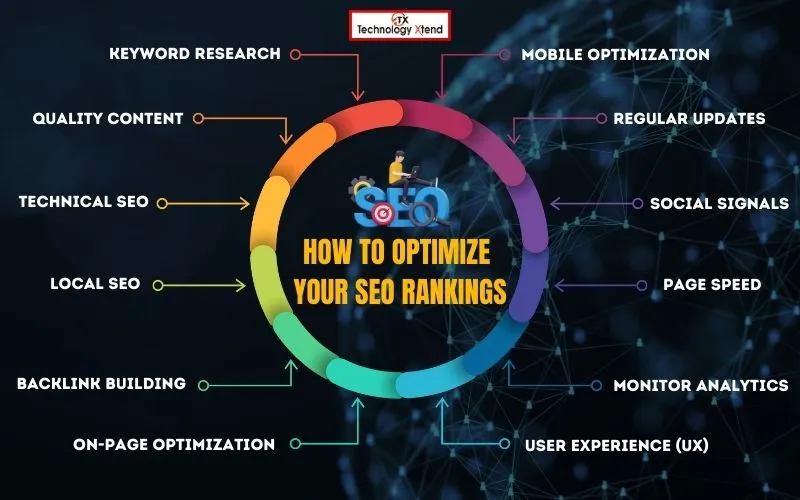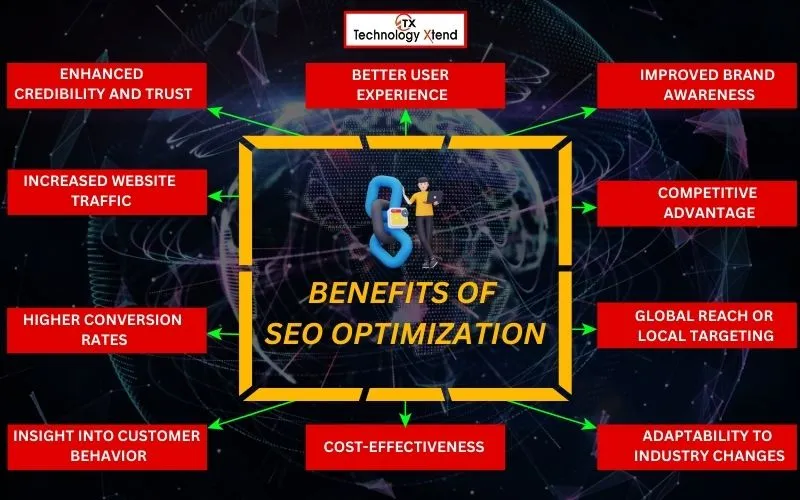
Technology XtendHow to Optimize Your SEO Rankings
Are you looking to improve your SEO rankings? If so, there are a few things you can do to optimize your website and web content for search engines. In this blog post, we'll share some tips on how to improve your SEO so you can get more traffic and improve your visibility online.

One of the most important things you can do to improve your SEO is to research keywords. Use relevant keywords throughout your website and in your web content, including in the title tags and meta descriptions of your pages. optimizing your site for Google by following their guidelines will also help improve your ranking. And finally, promoting your website through social media can also help increase traffic and improve your SEO.
So, if you're ready to learn more about how to Optimize Your SEO Rankings, read on!
There are a number of things you can do to optimize your website for SEO. Researching keywords is one way to optimize your website. Keywords are the words or phrases that people use when they search for something on the internet. When you research keywords, you can find out which keywords are most often used to search for your products or services. You can then use those keywords throughout your website, including in the title tags and meta descriptions of your web pages, to help improve your ranking on search engines.

Another way to optimize your website for SEO is to optimize it for Google. Google is the most popular search engine, so optimizing your site for Google will help improve your chances of being found by potential customers. One way to optimize your site for Google is to create an XML sitemap. This is a file that contains a list of all the pages on your website and helps Google index them correctly. You can also submit this sitemap to other directories and search engines, which can help improve your ranking even further.
Monitoring your SEO progress is another important part of optimization. There are a number of tools available that allow you to track how well your site is doing in terms of ranking on search engines. These tools can give you insights into what changes you need to make in order to improve your ranking.
There are a number of things you can do to promote your website through social media. For example, you can use Twitter to promote your website by tweeting links to your articles or blog posts. You can also use Facebook to promote your website by sharing links to your content on your personal profile or on business pages. Pinterest is another great platform for promoting your website, and you can do this by creating pins that link back to your website. Finally, don’t forget about Instagram. You can use hashtags to make sure people who are interested in what you do can find your content easily.
These are just a few of the many ways you can use social media to promote your website and increase your SEO rankings. So, get out there and start promoting!

One of the most important things you can do to improve your SEO is to research keywords. Use relevant keywords throughout your website and in your web content, including in the title tags and meta descriptions of your pages. optimizing your site for Google by following their guidelines will also help improve your ranking. And finally, promoting your website through social media can also help increase traffic and improve your SEO.
So, if you're ready to learn more about how to Optimize Your SEO Rankings, read on!
Optimize Your Website for SEO
As a business owner, you want to make sure that your website is optimized for search engine ranking. Search Engine Optimization (SEO) is the practice of improving the ranking of a website on search engines. The higher the ranking, the more likely people are to find your site.There are a number of things you can do to optimize your website for SEO. Researching keywords is one way to optimize your website. Keywords are the words or phrases that people use when they search for something on the internet. When you research keywords, you can find out which keywords are most often used to search for your products or services. You can then use those keywords throughout your website, including in the title tags and meta descriptions of your web pages, to help improve your ranking on search engines.

Another way to optimize your website for SEO is to optimize it for Google. Google is the most popular search engine, so optimizing your site for Google will help improve your chances of being found by potential customers. One way to optimize your site for Google is to create an XML sitemap. This is a file that contains a list of all the pages on your website and helps Google index them correctly. You can also submit this sitemap to other directories and search engines, which can help improve your ranking even further.
Monitoring your SEO progress is another important part of optimization. There are a number of tools available that allow you to track how well your site is doing in terms of ranking on search engines. These tools can give you insights into what changes you need to make in order to improve your ranking.
Optimize Your Web Content for SEO
As you create content for your website, it's important to keep SEO in mind. This will help ensure that your content is both search engine and user-friendly. Your title tags and meta descriptions are what show up in the search engine results pages (SERPs), so it's important to make sure they're optimized for both users and search engines. Here are some tips:- Write SEO-Friendly Title Tags and Meta Descriptions: The meta title and meta descriptions are what the search engine read out first. These both are very important so, take special care in writing these both.
- Use keywords thoughtfully: Stuffing your title tags and meta descriptions with too many keywords will not only turn off users, but also get you penalized by Google. Instead, use keywords thoughtfully and sparingly, focusing on quality over quantity.
- Keep it under 155 characters: While there's no hard-and-fast rule about how long your title tags and meta descriptions should be, a good general guideline is to keep them under 155 characters. This ensures that they're fully visible in the SERPs without getting cut off.
- Use unique descriptions for each page: Don't try to save time by using the same title tag and meta description across multiple pages of your website. Not only is this bad for SEO (since you're not targeting each page's unique keywords), but it also doesn't look very good to users who see the same description repeated multiple times in the SERPs.
- Use Headings and Subheadings: Headings and subheadings help break up your content into manageable chunks that are easy for both users and search engines to parse. Here are some tips:
- Use keyword-rich headings: Just like with your title tags and meta descriptions, it's important to use keywords thoughtfully in your headings and subheadings. In addition to being relevant to the topic at hand, these keywords should also be ones that you're reasonably confident you can rank for. If you stuff too many keywords into your headings, you run the risk of being penalized by Google for keyword stuffing.
- Make sure they're well-written: In addition to being keyword-rich, your headings and subheadings should also be clear, concise, and well-written. This will help ensure that both users and search engines can easily understand what each section of your content is about.
- Optimize Your Images: Images are an important part of any web page, both for users (who want to see what they're looking for) and search engines (which crawl images as part of their web crawling process). Here are some tips:
- Include descriptive file names: When you name your image files, make sure to include relevant keywords so that they can be easily found by both users and search engines alike. For example, rather than naming an image "DSC12345," try something like "boston-terrier-puppy."
- Use ALT text: Whenever possible, include ALT text with each image on your website. This is text that appears in place of an image if it can't be displayed for some reason, and it also allows search engines to "read" your images and index them accordingly.
- Compression: Be sure to compress your images before uploading them to your website. This helps reduce their file size, which makes your pages load faster (which is good for both users and search engines).
Publish High-Quality Content
This should go without saying, but it's worth repeating: One of the best things you can do for your website's SEO is to publish high-quality content. This means content that is well-written, informative, and relevant to your target audience. It also doesn't hurt to make sure that your content is keyword-rich (but don't overdo it!), as this will help it rank higher in the SERPs.Promote Your Website Through Social Media
As you probably know, social media is a powerful tool that can be used for marketing and promoting just about anything. In fact, social media is one of the most effective ways to promote your website and increase your SEO rankings.There are a number of things you can do to promote your website through social media. For example, you can use Twitter to promote your website by tweeting links to your articles or blog posts. You can also use Facebook to promote your website by sharing links to your content on your personal profile or on business pages. Pinterest is another great platform for promoting your website, and you can do this by creating pins that link back to your website. Finally, don’t forget about Instagram. You can use hashtags to make sure people who are interested in what you do can find your content easily.
These are just a few of the many ways you can use social media to promote your website and increase your SEO rankings. So, get out there and start promoting!
Conclusion
In conclusion, if you want to optimize your SEO rankings, you need to focus on two things: optimizing your website for SEO and promoting your website through social media. Start by doing keyword research, using keywords throughout your site, and optimizing your site for Google. Then, create SEO-friendly title tags and meta descriptions, use headings and subheadings, and optimize your images. Finally, Use Twitter, Facebook, Pinterest, and Instagram to promote your website.Related Articles









































